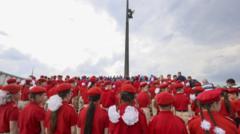In a concerning initiative, Russian-affiliated groups are targeting Ukrainian children in occupied territories, introducing patriotism through military-themed education and cultural indoctrination, while thousands of children face forced deportation to Russia.
Indoctrination Efforts Target Ukrainian Youth in Occupied Regions

Indoctrination Efforts Target Ukrainian Youth in Occupied Regions
In occupied areas of Ukraine, Russia is implementing a campaign aimed at embedding loyalty and allegiance among children, fostering pro-Russian sentiments through militarization and forced education.
In occupied regions of eastern Ukraine, a troubling campaign has emerged as Russia aims to indoctrinate children and impress upon them a sense of loyalty to the Russian state. In Luhansk, nursery school kids clutch large banners emblazoned with the Russian military symbol "Z," while others enthusiastically chant pro-Russian slogans to loud music. Meanwhile, in Anthracite, young children are engaged in crafting trench candles and blankets for Russian soldiers, highlighting the systematic attempt to erase their Ukrainian identity.
Moscow's efforts are facilitated by a shortage of Ukrainian teachers—many of whom have fled due to the ongoing conflict. To counter this, Russian authorities are incentivizing teachers to relocate to occupied areas, offering substantial financial rewards to entice them. The prominent organization at the forefront of these efforts is Yunarmia, a youth military group linked to the Russian Ministry of Defense that actively seeks to recruit children as young as eight, providing training that emphasizes military service.
The European Union and the United Kingdom have imposed sanctions on Yunarmia, condemning its role in the "militarization" of Ukrainian youth. In tandem with Yunarmia, other organizations such as the "Movement of the First Ones" and an extensive network for military and athletic training have invaded schools, pushing curricula that glorify Russia's military actions. Children are taught using Russian textbooks that downplay Ukrainian sovereignty, misrepresenting the nation as a mere construct of Western antagonism towards Russia.
Reports from Ukrainian youth reveal coercion within educational institutions, where students, like Lisa from Donetsk, recount mandatory participation in pro-Russian events, repeated recitation of the Russian anthem, and the display of patriotic fervor enforced by their teachers. Many children have even been taken on orchestrated tours of Russia, supposedly for cultural engagement, but in reality directed at emotional manipulation and allegiance-building. Human rights observers have voiced outrage, noting that kids are forcibly deported to Russia, with the Ukrainian government estimating over 19,000 cases.
International law strictly prohibits such actions by occupying powers, yet Russia has brushed aside these laws, perpetuating a systematic campaign to imprint pro-Russian ideologies onto the youngest generation in occupied Ukraine. As the leader of Russia faces international scrutiny and allegations of unlawful deportation of children, his administration remains resolute in its pursuit of cultural and territorial domination over Ukraine.



















